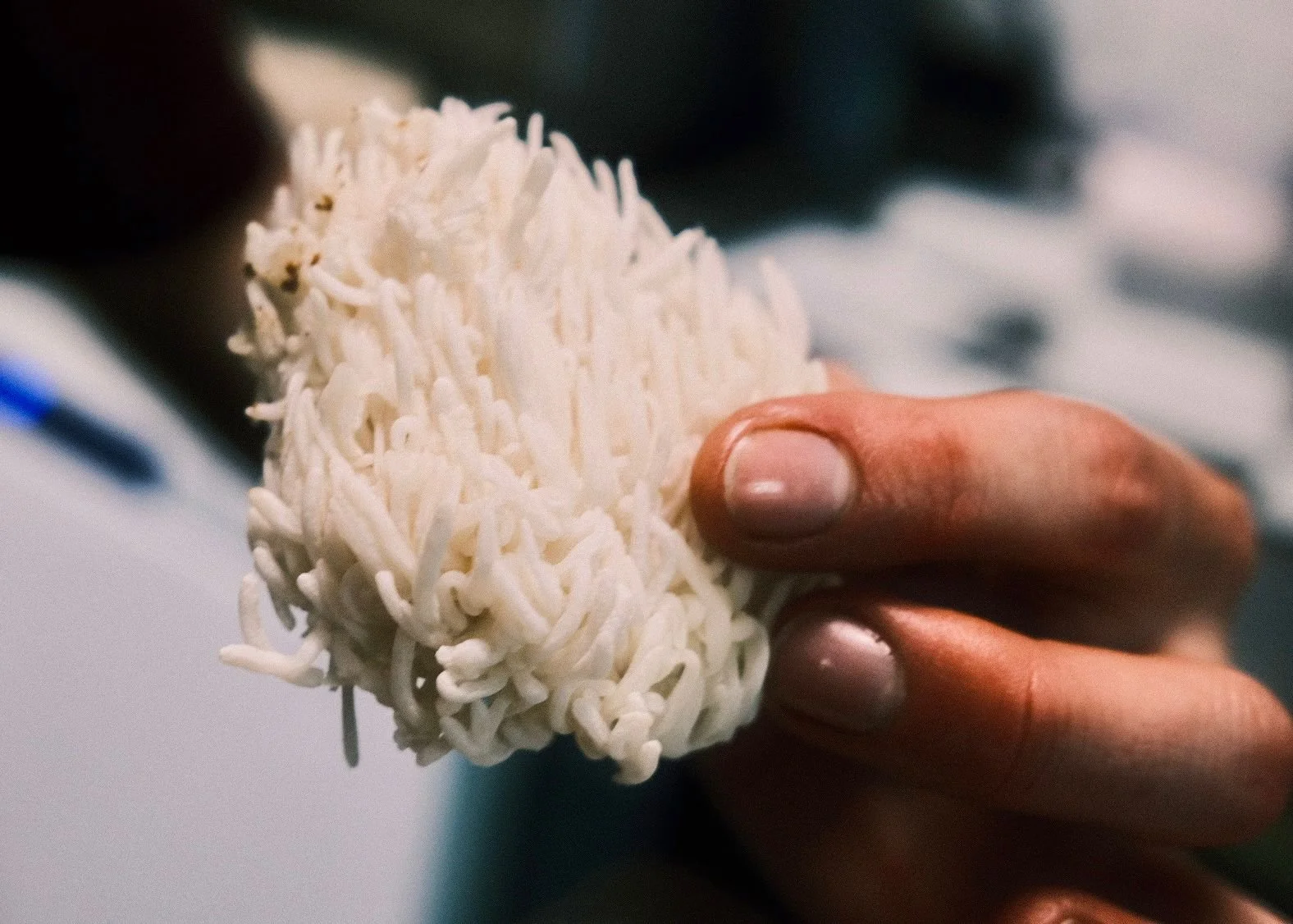Interview with Zoë & Björn
We had Zoë and Björn as guests at Cloud and interviewed them about their craft as chefs, their love for cooking and their project Kaati Kookt, where they host benefit dinners in small venues all around Amsterdam to fundraise money for bees. In this conversation, they open up about their love for mushrooms and what you can expect from the dinner on the 29th of November as part of the Fundamental Fungi exhibition.
Fungus Paradisi by Kaati Kookt
On this cozy occasion we are going to take your taste buds on a journey through the paradise of edible fungi. Our friends from Kaati Kookt, Chefs Zoë & Björn, have created a special menu for you, exploring the neurological effects of mushrooms to spoil your brains & belly. Drinks curated by d'Sjoemmelier.
Jan: Can you introduce yourself and Kaati Kookt?
Björn: Hi, I'm Björn, one of the chefs of Kaati Kookt. Joining me is the other chef of Kaati Kookt.
Zoë: Hello, I'm Zoë, and I'm also a chef at Kaati Kookt.
Björn: So, what is Kaati Kookt? It’s a collaboration of food lovers and culinary experts, — including Zoë, my brother and myself. We host benefit dinners around Amsterdam that raise money for good causes, especially for bees. Our support isn’t limited to the Netherlands; it’s more about the global wellbeing of bees.
We were able to host one of these dinners at Cloud, thanks to Nia. It was such a wholesome and successful event that she invited us back. Now, we’re here again at Cloud, hoping to create a delicious and, maybe, even a little mesmerizing dining experience as part of this special fungi exhibition.
Jan: How did this project come to be?
Björn: This project started— in a nutshell—when I began making a mead, an Ethiopian honey wine made from honey. Then I started distilling it. The distilled drink is called Kaati, named after katikala, which is Amharic for a home-style distilled drink. In the process of gathering ingredients to make more honey wine, I learned about the struggles honey bees are facing. After talking with people around me, like Zoë and my brother Sebas, we came up with the idea of hosting these kinds of benefit events and dinners. And that’s how it all started rolling, and now this is mostly what we do.
Zoë: For our dinners, we always look for locations that feel welcoming and where we’re at ease. We aim to set up a long table because it’s about sharing food and experiencing different tastes and impressions together. It’s also about bringing people together to share a meal with the goal of donating most of the proceeds to support bees or biodiversity. Actually, it’s not only about bees, but about understanding what biodiversity needs right now.
Jan: What foundations do you support?
Björn: Um, yeah, various ones. We've supported organizations like the Bee Foundation, and Bee Serious and we also contributed to a foundation in Ethiopia that trains people to become beekeepers. We’ve donated to another organization that creates an oasis for insect biodiversity—not just honeybees, but also solitary bees. In the Netherlands, we supported a similar foundation. Since we’re always looking for different locations to host dinners, we also aim to support a variety of foundations. There are so many out there, and it’s hard to choose just one as “the best” because the truth usually lies somewhere in the middle. So, we prefer to spread our donations across different foundations, which feels healthier to us than focusing on only one. This way we can also check in on how each foundation is doing, if they are actually doing something recently in the year or the coming year, seeing if they have an active plan. We try not to exclude something, which is also part of the process. Even the guests that come to the Kaati Kookt dinners are very diverse. There are always a few people from one group and a few people from another group. And the beauty of it is, that they arrive together, sit at a long table and it doesn't feel like there are groups sitting apart anymore, like in a restaurant. It’s just one big group and one big family.
Jan: And they cross-pollinate.
Björn: Exactly. [laughs] Also, we keep the meals mostly vegan because it aligns more logically with what we’re raising money for.
Zoë: Occasionally, we might include some local honey, and we keep a connection to kaati, Björn’s drink. We prioritize seasonal, local ingredients as much as possible. Of course, sometimes we add a touch of something from elsewhere to create a bit of magic, but that’s always with a conscious approach.
Jan: Could you share some highlights from the menu and the types of mushrooms?
Zoë: We did quite a bit of research, starting with which mushrooms are edible and which are not, since there’s an incredible variety of mushrooms we don’t typically encounter in our daily lives. Mushrooms aren’t only about champignons.
For the menu, I was particularly focused on the concept for the final course. I thought, “What do I want to end this dinner with?” So, I wanted something brain-stimulating, with a symbolic message. In many cultures, mushrooms carry deep symbolic meanings. I wanted to combine those two aspects—the gourmet side and the cultural story—bringing in both flavor and the deeper significance of mushrooms across different traditions.
Jan: How did you approach that ? Or is that going to be a surprise ?
Zoë: Well, it’s going to be a bit of a surprise, partly because it depends on whether we can get certain mushrooms. Ideally, we’d like to include specific types, but not all of them are native to Western Europe. The question becomes, can we actually source them here? Or do we adjust the menu to use what we can find locally?
Björn: Yes, exactly. Some mushrooms need to be cultivated months in advance, so you’d have to be certain ahead of time that you’re actually going to use them. What inspired me most for this menu were some mushroom dishes that I already made in my life, in my career, that were “happy little accidents”. I took inspiration from those dishes to kind of recreate or amplify the message in each dish. The result, I hope, is what Zoë is saying— brain-stimulating, physically stimulating, and also culinary, very stimulating. Ideally, it’s even mesmerizing, where guests discover flavors from mushrooms they wouldn’t expect. Like Zoë said, it’s not only about the champignon; each type of mushroom has its own distinct taste and specific synergy with other ingredients.
Jan: What unique culinary techniques are you going to showcase?
Björn: Well, one of Zoë’s specialties…
Zoë: My specialty is sweets.
Björn: Which is an unusual combination with mushrooms!
Zoë: Yes, exactly. So, you can expect a sweet twist with mushrooms—which isn’t something you come across every day! Let’s just say, there’s definitely dessert on the menu. [laughs]
Jan: What do you hope guests will take away from this mushroom-centric dining experience?
Björn: For me, I hope people will leave with a completely new perspective on mushrooms, especially in the culinary field. I want them to think, "Oh, I didn’t know mushrooms could taste like this!" or "It does this to my body and it’s actually healthy!" Instead of just being told that mushrooms are good for you, I want them to walk out of here and say, "I just ate an otaku mushroom, and it was great for my bowels, and now I know why." Every time they walk through the supermarket or market and see those mushrooms, they’ll think, "Thanks to Cloud, I know."
Zoë: For me, it’s not just about the taste, but also the appearance. Mushrooms can look slimy or delicate, or even super elaborate. It’s about learning to appreciate mushrooms for what they are, both in taste and visually. I want to inspire people to be open to unusual or unexpected combinations. Mushrooms aren’t just about the common champignon, and I hope to expand people’s perspectives on that.
And happy people! This is what I want! Happy people.
Björn: Definitely!
Jan: And lastly, what do you love most about cooking and this craft that you both do?
Björn: It’s very rewarding. You can see the results almost instantly—like when you start making bread, from the moment you make the dough to when it comes out of the oven hours later. You see the transformation right in front of you. It's connected to people, most of the time, because you're cooking for human beings that either love your food or like it. So you also get a lot of recognition and appreciation. And you're definitely working in a field that is necessary because we all need to eat to survive. Of course, you can take pills here and there. But from a social perspective… talking with people sitting together over dinner. Every burger tastes better when you share it with someone you like. Being able to work in this profession and teach people about food, how to eat well and their diet is something I take great responsibility for as a chef. It gives me a good, purpose driven feeling behind waking up especially when you wake up and think, “Who am I doing this for?”. Even if you don’t know the people you’re cooking for, my chef always told me, "Cook every plate as if you’re cooking it for the person you love most." If you do that, you always have a positive feeling and vibe around you, and that attracts others.
Zoë: The social aspect, as already mentioned. To me, cooking is very personal. When I create something, I compare it to an art process—because well I come from the arts—but it's the same kind of process. You gather ideas in your mind and then create something from them. I can like my own food, but when I cook it for others, and they enjoy it, that gives me so much happiness. That’s the socially rewarding part. There’s also this amazing freedom in cooking—there’s so much you can experiment with. You can do weird, crazy things, and sometimes they actually turn out tasty!
Björn: It’s very inviting, easy to roll in. Everybody can pick up a knife or a pan and start doing it. It’s not very exclusive in that sense, unlike other professions, where you might have to do like, six years of study before you maybe have a chance to work in it.
Zoë: Yeah, it's very communal, brings people together.
Björn: Exactly. It bridges cultures and is as well, just universal.
Zoë: Come to our dinner! [both laugh]





